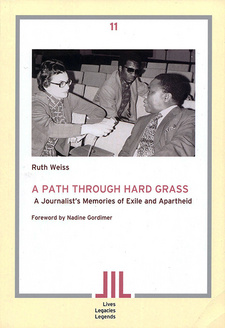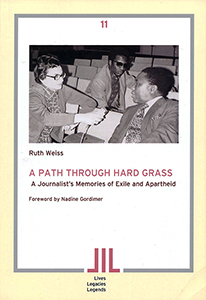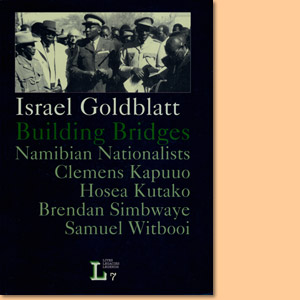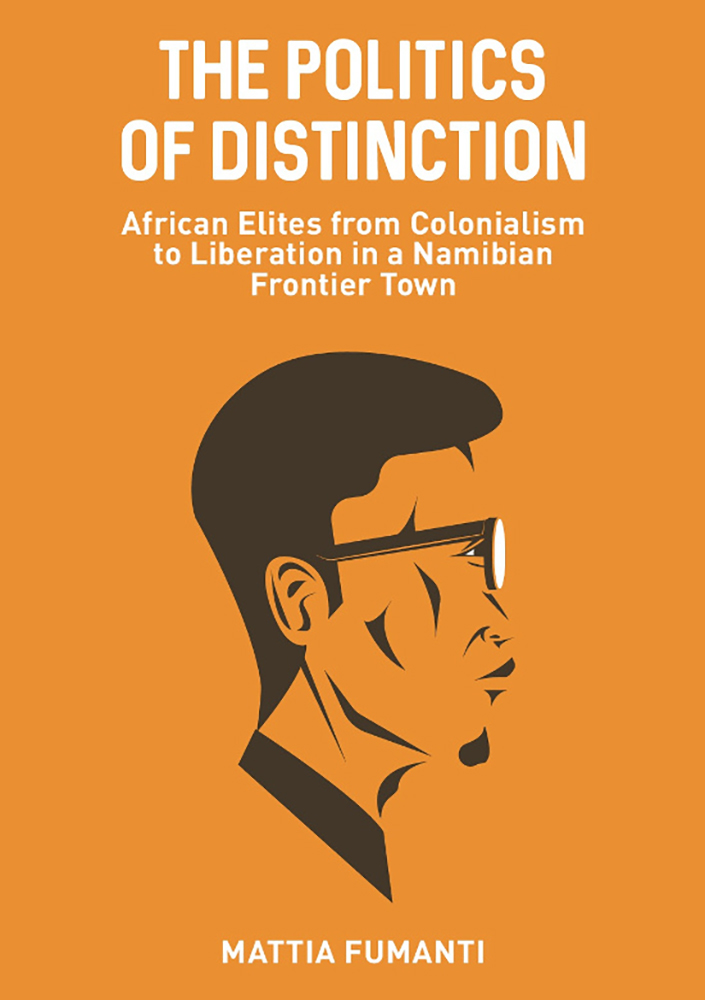A Path through Hard Grass: A Journalist's Memories of Exile and Apartheid, by Ruth Weiss

A Path through Hard Grass: A Journalist's Memories of Exile and Apartheid, by Ruth Weiss. Basler Afrika Bibliographien. Basel, Switzerland 2014. ISBN 9783905758399 / ISBN 978-3-905758-39-9
The cover photograph of A Path through Hard Grass: A Journalist's Memories of Exile and Apartheid shows Ruth Weiss interviewing Reverend Ndabaningi Sithole in Geneva in 1976 during the Rhodesia Constitutional Conference. Sithole, a founder of the Zimbabwean liberation party ZANU and its first President, became a political opponent of Robert Mugabe during the transitional period of Zimbabwe's independence in 1979/80.
[...] I (Nadine Gordimer) have to say that Ruth Weiss is a most unexpected personality, and hers is an unexpected book. This is a personal reaction that goes back more than thirty years, in respect of her persona, and that has been renewed in respect of the book she has now written. The shy young woman I met in the shadow of a highly intellectual husband many years her senior revealed no hint, in her lack of self-assertion, of an innovative intelligence, political acumen, and courage to take risks which were there within her. The natural modesty that has remained with the mature woman in the self-confidence of her independence, her years of achievement, has made it seem unlikely that this woman, who is so deeply involved in the lives and destinies of others, would ever confide herself to the pages of an autobiography. I know, knowing her so well, so long, that she has not been prompted by vanity; nothing could be further from her nature. I believe that, considering her life, she came to see, as anyone reading this book will, that fate, chance, an accident of birth and the drama of history, call It what you will, have woven her life into a pattern belonging specifically to our century, a piece of social history that should not be kept to herself, but set down for us, her contemporaries. For a life shaped and directed principally by two (the third being the rise and fall of socialism) of the characterising events of the twentieth century, facism/racism in Europe, and the apogee of all racism in its phase in South Africa, Is something of a paradigm of the human condition in our century. The time for summing-up is here in the tenth decade. It was unexpected to find out, as I eventually did, that the shy young woman, apparently meek disciple at her husband's feet, was in fact writing the artices of política i analysis of the 1950s and 60s in South Africa that appeared under his byline in prominent German newspapers. This is not to deny that she learned a great deal from him; but it Is an early example of how Ruth Weiss, all through her life, has been wonderfully open to learning, and had the capacity to grow from it. She, so uncaring about money, and always having so little of it herself, became a financial journalist of repute in both Africa and England. She, a white and a European, listened to and learned from blacks in her own country, South Africa, and in Zambia, Zimbabwe, where she became a shrewd and greatly trusted Interpreter of African thought, aims and strategies, and a friend of many black leaders and -perhaps more important - ordinary people. She has passed on her journalistic skills to a whole generation of young Africans studying the media. Her account of this (continuing) phase in her life is the answer to those who throw up their hands and ask, what can a white do in Africa? Her identification with the problems of Africa, and in particular those of the people of the southern African states, is more than a matter of applied intelligence: she has proved herself to be, and is totally accepted by Africans as, one of themselves. Africanness is not only a matter of skin; it's a matter of heart and human commitment, and she has both. This quiet woman has been daring in her political associations and acts. [...]
This is an excerpt from the foreword to the biography: A Path through Hard Grass: A Journalist's Memories of Exile and Apartheid, by Ruth Weiss.
Subtitle: A Journalist's Memories of Exile and Apartheid
Author: Ruth Weiss
Genre: Biography
Series: Lives Legacies Legends
Publisher: Basler Afrika Bibliographien
Basel, Switzerland 2014
ISBN 9783905758399 / ISBN 978-3-905758-39-9
Softcover, 17 x 24 cm, 276 pages, several b/w photos
Weiss, Ruth im Namibiana-Buchangebot
A Path through Hard Grass: A Journalist's Memories of Exile and Apartheid
A Path through Hard Grass is journalist Ruth Weiss's Memories of Exile and Apartheid in South Africa.
Weitere Buchempfehlungen
Israel Goldblatt Building Bridges: Namibian Nationalists Clemens Kapuuo, Hosea Kutako, Samuel Witbooi, Brendan Simbwaye
A tribute to Israel Goldblatt and the Namibian nationalists Clemens Kapuuo, Hosea Kutako, Samuel Witbooi, Brendan Simbwaye who attempted to build bridges where there was hatred and racism.
The Politics of Distinction: African Elites from Colonialism to Liberation in a Namibian Frontier Town
Insightful ethnography: The Politics of distinction, African elites from colonialism to liberation in Rundu, a Namibian frontier town.
Burgers Tochter
Der Südafrika-Roman 'Burgers Tochter' ist in radikal subjektiver, lakonisch schöner Prosa gefaßt.
Der Ehrengast
Der berühmte Roman 'Der Ehrengast' ist eine poetische Parabel über das politische Dilemma Schwarzafrikas und die Geschichte einer großen Liebe.
Niemand, der mit mir geht
Niemand, der mit mir geht ist ein leidenschaftlicher Roman von den politischen und gesellschaftlichen Veränderung in Südafrika.






